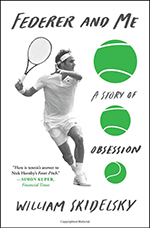Roger Federer 5 Years On
William Skidelsky

In 2014, having paid a tout a small fortune for the privilege, I went to my first ever Wimbledon men's final. Over nearly four hours, I watched my idol, Roger Federer, do his best to defeat Novak Djokovic. He came reasonably close, saving a match point in the fourth set before levelling up at two sets all.
For a while, many of us thought we were watching a miracle unfold. But then Djokovic suddenly reverted to full on lock down mode, and ran out a comfortable winner in the final set.
The match features prominently in my 2015 memoir, Federer and Me: a Story of Obsession. (Click Here.) The book opens with my desperate last-minute attempts to buy a ticket, and ends with me and a group of fellow Federer fans lamenting our hero's defeat.
It struck me as a logical framing device, not just because it was a Wimbledon final (and I was there!), but also because it felt like a swan song: I seriously doubted Federer would have a realistic chance of winning a Grand Slam again.
You have to remember the context here. At the time, he was a month shy of 33 – well into a tennis player's supposed senescence – and his career, the previous year, had looked seriously on the skids: those baffling losses to Stakhovsky and Robredo; the initially unsuccessful experiments with the larger-headed racket.
It seemed to me – and many others – that the end was drawing nigh. But what a glorious last stand his run at Wimbledon had been.

Five and a half years on, those valedictory assumptions look pretty silly. Federer, now aged 38, is ranked three in the world. He has made it to another six Grand Slam finals, winning three.
He hasn't been the dominant player of the past five years, but he has, with Djokovic and Nadal, maintained the triumvirate. Tthose three have won 18 of the 22 Grand Slams played, shutting out the younger generation.
In the process, he has helped redefine the very notion of sporting longevity. Nor does he look in imminent danger of hanging up his racket. Odd though it seems, the retirement question crops up less often in press conferences today than it did six or seven years ago.
Therefore, one of the central assumptions of my book--that I was surveying, more or less, the full sweep of his career – turned out to be wrong. And that wasn't the only thing.
As readers of the extracts that appeared on this site have noticed, I really had it in for Nadal. For me, the Spaniard was far more than just a rival.
He was Federer's nemesis, a player purpose-built (thanks Uncle Toni) to reveal flaws in the Swiss player's technique and temperament that no one else had managed to expose. I described him as a "messenger from a future gone wrong", an emissary sent by the tennis gods to "smash Federer's artistry, his subtlety, to pieces."
Again, this doesn't seem quite right now. It's not that I regret being rude about Nadal. But what's undoubtedly changed is that Nadal no longer poses the threat he once did. For me, one of the best things about the past few years has been watching Federer free himself from the Spaniard's "curse”.

It all began, of course, with the 2017 Australian Open final. Early in the final set, the match looked to be going the way of so many of its predecessors. Federer had led, but had relinquished his advantage. Nadal looked irrepressible; he was a break up. With the ghosts of crushing past losses gathering, my mood became funereally bleak.
And then, a miracle truly did happen. Instead of being browbeaten by Nadal's resilience, Federer upped his game. Those crosscourt backhand winners in that final set surely rank among his greatest ever shots. Then there was the extraordinary 26 shot rally to set up the crucial break point: a brutal exchange (nearly every shot perfect) brought to an end by Federer at full stretch on his forehand almost blocking the ball for a down the line winner.
Maybe it's my imagination, but that win released Federer from his Nadal related mental shackles. They played three more times that year, and Federer won every time.
In fact, he has only lost once to Nadal since – and that was on clay, so it barely counts. No one talks any more about Federer's problems dealing with Nadal's spinning ball to his backhand. Statistical parity will never be restored to their rivalry, but their current head-to-record (16-24) is a lot more respectable than it was in 2015.
With this, something else has changed: Federer's flaws look less Nadal-specific than they once did. There's "breakpointitis” – his infuriating inability, in key matches, to convert break points – and his woeful record in final set tiebreaks.
Federer has aged extraordinarily well – even if his status as the GOAT remains uncertain, he is unquestionably the best 38-year-old ever to pick up a racket – but the process has also softened him, made him less God-like.

These days, being a Federer fan feels very different from how it once did: there's less awed contemplation, fewer "Federer moments”, less talk even of beauty. What there is, instead, is deep gratitude for the pleasure he has given, astonished admiration at the fact that he is still playing, and a kind of resigned exasperation which can shade into comedy – the deja vu of watching him mess things up, yet again.
That said, being a Federer fan still has the potential to cause extreme heartbreak. Last summer, I went to my second ever Wimbledon final. The date was July 14th: my birthday. Over nearly five hours, I watched my idol doing his best to defeat Novak Djokovic.
Before the match, when it emerged that a friend could get me a ticket, I'd briefly prevaricated over whether to go. What if he lost – and on my birthday? Would I be able to bear the blow? I went keenly aware of the risks.
However, Federer, that day, seemed different from in 2014, and from in other past tussles with Djokovic. He played with more freedom, rushed the net more, hit more winners from the back of the court. Of course, it wasn't easy – this was Djokovic – but as the match wore on, things increasingly pointed to a thrilling possibility: that Federer, having beaten his two greatest rivals in quick succession, would, at 37 and 11 months, become the oldest male Grand Slam winner of the Open era. What a magical culmination to his career!
At 7-7 in the deciding set, Federer broke. Then he served, seemingly fearlessly, successive aces bringing up two match points. Smoothly the ball arced up from his left hand, and, in that still moment before his racket came down, I readied myself to rise in ecstasy and weep tears of joy at what I'd just witnessed.
As we know, it wasn't to be. Instead, what could well be the most astonishing turnaround in tennis history – given the magnitude of the occasion – unfolded before my horrified eyes. The match points were squandered (or did Djokovic save them?) In the space of a few minutes, the prospect of boundless delight gave way to the worst kind of misery.
Federer didn't cave in: he continued to battle; he kept holding his serve, even brought up another break point, at 11-11. But there was no doubting what would happen once the set reached 12-12, and the match tiebreak – introduced for the first time that year – got underway: Federer was awful in breakers that day.

In the context of Federer's overall career, it's hard to know what to make of his loss to Djokovic last July. There is the somewhat comforting argument that since Federer had no right to be in that final in the first place, the fact that he lost it in the most astonishingly awful fashion isn't really so very terrible. At the age of 37, you feel grateful for whatever you get, and don't regret the near-misses as much as in the past. This line of thinking has certainly helped me somewhat over the past few months.
And yet, and yet...Had Federer won that day, he would have become, at 37 and 11 months, the oldest Grand Slam winner of the Open era. And he would have pulled off the feat by beating his two greatest rivals in quick succession. It is hard to imagine a more glorious culmination to his career.
Federer claims (and I'm sure he's right) he can put terrible losses behind him, think only about what lies ahead. It isn't necessarily so easy for us fans. We are the ones who lie awake in the darkness, endlessly replaying those few key points.
That second serve at 40-15. Wasn't it just a bit timid? That forehand approach shot at 40-30. Had it just been two feet closer to the line, then surely Djokovic wouldn't have been able to hook his passing shot round. He would, instead, have had to put up a lob, which you just know that Federer wouldn't have missed.
At a certain point, though, you have to move on. One day, Federer will hang up his racket. Perhaps this will even happen in a few months time: the news, this month, that he had again undergone knee surgery was a reminder that retirement may not be all that far away.
After that, there will be no more opportunities for glory, no more heartbreaking defeats. The rawness of it all will fade; Federer's battles will become anecdotes, fables from the history of tennis. The years will pass by, and Federer will become an Edberg, a Sampras, a Laver, eventually a Tilden. He will, you just know, have a good life post-tennis: not because of the fame and money, but because he has never lived only for tennis. And I will look back on my life as a Federer fan and think that while some of it may have been craziness – all that emotion about some tennis matches? – it also played an important role in my life, and I wouldn't actually change anything.





